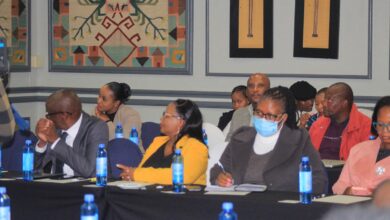Maseru Meeting Seeks Solutions for Compensation of Ex-Mineworkers with Tuberculosis and Silicosis

In a significant move to address the plight of Basotho ex-mineworkers who contracted Tuberculosis (TB) and Silicosis while working in South African mines, the Parliamentary Social Cluster, the Mineworkers Council of Lesotho, and the Government Ex-Mineworkers Task Team convened in Maseru on Wednesday. The meeting aimed to find a solution to the ongoing challenges that have hindered compensation for these workers, many of whom have suffered due to the hazardous working conditions in the mines.
The Social Cluster Chairperson, Mr. Mokhothu Makhalanyane, chaired the session and expressed the need for immediate action. He emphasized that the primary objective of the meeting was to develop strategies that would address the issues preventing the timely and effective payment of ex-mineworkers. “We must find practical solutions to overcome the obstacles that have delayed compensation and ensure that our ex-mineworkers receive the justice they deserve,” Mr. Makhalanyane stated.
Earlier discussions during the meeting revealed that a total of M5 billion had been set aside to compensate ex-mineworkers from ten different countries. However, it was disclosed that only 50 percent of this fund has been utilized to date, leaving a substantial portion unallocated. This raised concerns about the slow pace of payments and the inefficiency in distributing the funds to those who have suffered from the debilitating diseases contracted while working in the mines.
The meeting brought together various key stakeholders, including representatives from the African Union (AU), the Southern African Development Community (SADC), and the International European Union Board, among others. Their involvement highlighted the regional and international importance of addressing the issue and ensuring that the affected workers receive the necessary compensation and support.
The ex-mineworkers, many of whom are elderly and facing severe health challenges, have long struggled to receive compensation despite their exposure to harmful dust and poor working conditions in the mines. This has led to widespread public outcry and calls for more effective measures to secure the rightful compensation for these workers.
As the discussions continued, there was a strong focus on creating a clear framework for the disbursement of the remaining funds, ensuring transparency, and streamlining the process to reach all deserving beneficiaries. The collaboration between the various stakeholders is seen as a crucial step towards resolving the longstanding issue and providing justice to the affected ex-mineworkers in Lesotho and beyond.




